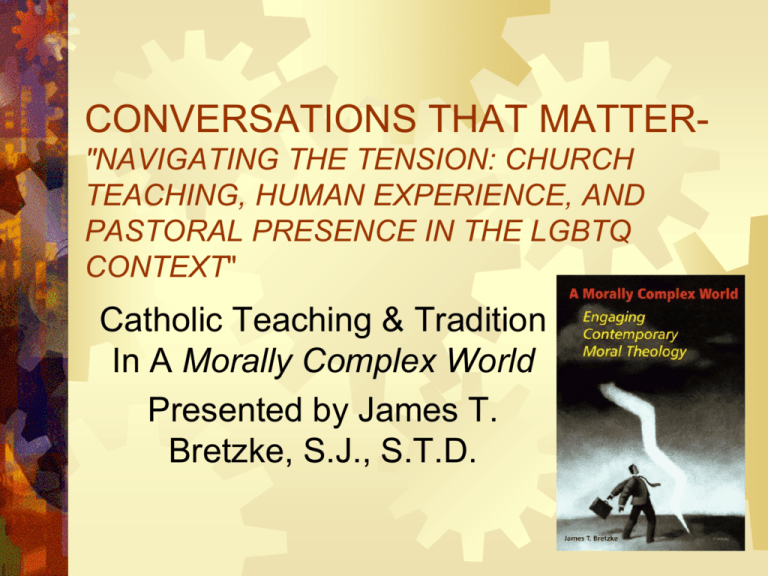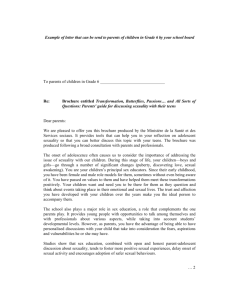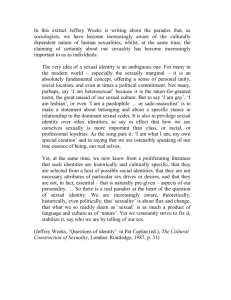
CONVERSATIONS THAT MATTER"NAVIGATING THE TENSION: CHURCH
TEACHING, HUMAN EXPERIENCE, AND
PASTORAL PRESENCE IN THE LGBTQ
CONTEXT"
Catholic Teaching & Tradition
In A Morally Complex World
Presented by James T.
Bretzke, S.J., S.T.D.
Theory or Theories?
Catechism of the Catholic
Church on Sexuality
Personalist
and Physicalist Paradigms
are both in evidence in the Catechism
Much of the material on homosexuality
comes from the 1975 CDF Declaration
on Sexual Ethics Persona humana
(which reproduces a chapter of Cardinal
Palazzini’s book Vita e virtù cristiane)
Sexuality as Human Modality
2332
Sexuality affects all aspects of the
human person in the unity of his body
and soul. It especially concerns
affectivity, the capacity to love and to
procreate, and in a more general way
the aptitude for forming bonds of
communion with others.
2333 Everyone, man and woman,
should acknowledge and accept his
sexual identity.
The Vocation of Chastity
2337 Chastity means the successful
integration of sexuality within the person and
thus the inner unity of man in his bodily and
spiritual being.
Sexuality, in which man's belonging to the
bodily and biological world is expressed,
becomes personal and truly human when it is
integrated into the relationship of one person
to another, in the complete and lifelong
mutual gift of a man and a woman.
Personal Integrity of Sexuality
2338
The chaste person maintains the
integrity of the powers of life and love
placed in him. This integrity ensures the
unity of the person; it is opposed to any
behavior that would impair it. It tolerates
neither a double life nor duplicity in
speech.
Homosexuality NOT Chosen
2358
“They do not choose their
condition. For most of them it is a trial.
They must be accepted with respect,
compassion and sensitivity. Every form
of unjust discrimination in their regard
should be avoided.”
This has been official Church teaching
since the 1975 CDF Persona humana
Thus, “reparative therapy” is NOT
mandated by the Magisterium
Traditional Moral Concepts in
the Physicalist Paradigm
Fonts
of Moral Theology
Contra naturam
Ex toto genere suo
In re venerea
Parvitas materiae in Sexto
Deus impossibilia non iubet
Catechism & Homosexuality
2357 “Basing itself on Sacred Scripture,
which presents homosexuality as a grave
depravity, tradition has always declared
that homosexual acts are intrinsically
disordered. They are contrary to the
natural law. They close the sexual act to
the gift of life. They do not proceed from
genuine affective and sexual
complementarity. Under no circumstances
can they be approved.”
A Gloss on Contra Naturam &
“Intrinsically Disordered”
Against the “nature” or end/purpose of a faculty of the
human person
Faculty of sex ordered to procreation so every nonprocreative sexual activity is “intrinsically disordered”
since by blocking procreation it frustrates the primary
“nature” of sexual relations.
Persons are not in themselves “disordered” but
Adultery, Bestiality, Fornication, Homogenital acts,
Masturbation, Rape, etc. are all “disordered” acts.
Some recent Vatican documents and the Synod Final
Report have begun to employ the terminology
“homosexual tendencies” (though the precise
“meaning” of this term is unclear and open to a
variety of interpretations)
Homosexuals Called to
Chastity
2359
“Homosexual persons are called
to chastity. By the virtues of selfmastery that teach them inner freedom,
at times by the support of disinterested
friendship, by prayer and sacramental
grace, they can and should gradually
and resolutely approach Christian
perfection.”
Who Am I To Judge?
What Exactly Does This Mean, and NOT Mean?
The Pirolas & Cardinal Burke
The Pirolas’ Synod
Presentation on
Acceptance of Gay
Children
Friends of ours were planning their Christmas
family gathering when their gay son said he
wanted to bring his partner home too. They fully
believed in the Church’s teachings and they
knew their grandchildren would see them
welcome the son and his partner into the family.
Their response could be summed up in three
words, ‘He is our son’.
Cardinal Burke’s Interview
after the Pirola’s Synod
Presentation:
“If homosexual relations are
intrinsically disordered, which indeed
they are — reason teaches us that
and also our faith — then, what
would it mean to grandchildren to
have present at a family gathering a
family member who is living [in] a
disordered relationship with another
person?”
US Bishops 1997 Pastoral Letter Always
Our Children Advice to Parents
“First, don't break off contact; don't reject your
child.”
“This child, who has always been God's gift to
you, may now be the cause of another gift:
your family becoming more honest,
respectful, and supportive.”
“God loves every person as a unique
individual. Sexual identity helps to define the
unique persons we are, and one component
of our sexual identity is sexual orientation.”
Mid-Synod “Relatio”: Accogliere
Welcoming homosexual persons
Homosexuals have gifts and qualities to offer to the
Christian community: are we capable of welcoming
these people, guaranteeing to them a fraternal
space in our communities? Often they wish to
encounter a Church that offers them a welcoming
home. Are our communities capable of providing
that, accepting and valuing their sexual orientation,
without compromising Catholic doctrine on the family
and matrimony?
Dispute over the English translation of the Italian
original (Translator Traditor “The Translator is the
Traitor”)
Formal Correspondence or
Dynamic Un-Equivalence?
Accogliere le persone omosessuali
Welcoming homosexual persons
Providing for homosexual persons
…si prende atto che vi sono casi in cui il mutuo
sostegno fino al sacrificio costituisce un appoggio
prezioso per la vita dei partners
it has to be noted that there are cases in which mutual
aid to the point of sacrifice constitutes a precious
support in the life of the partners
there are instances where mutual assistance to the
point of sacrifice is a valuable support in the life of these
persons.
Final Synod Relatio Vote on
Treat Homosexuals with Respect
#55:
Placet 118; Non placet 62: Total
180 with 65.5% YES and 34.5% NO
Probably the “key” sentence was
Nevertheless, men and women with
homosexual tendencies ought to be treated
with respect and delicacy
Some probably voted «NO» believing this
whole paragraph too watered down; others
might have voted «NO» fearing it would signal
tacit acceptance of an «intrinsically
disordered» orientation
Tensions within Church Teaching
Sexuality Is a God-Given
Good
2332 Sexuality affects all
aspects of the human person
in the unity of his body and
soul. It especially concerns
affectivity, the capacity to love
and to procreate, and in a
more general way the aptitude
for forming bonds of
communion with others.
2333 Everyone, man and
woman, should acknowledge
and accept his sexual identity.
Same-Sex Orientation Is
Seriously Disordered
2357 “Basing itself on Sacred
Scripture, which presents
homosexuality as a grave
depravity, tradition has always
declared that homosexual acts are
intrinsically disordered. They are
contrary to the natural law.
They close the sexual act to the
gift of life. They do not proceed
from genuine affective and sexual
complementarity. Under no
circumstances can they be
approved.”
Two Contrasting Basic Views
One basic human
sexual nature which
is designed by God to
be heterosexual,
ordered to
procreation in the
context of marital
complementarity
Any other expression
is intrinsically
disordered
There are more than
one sexual nature
created by God
Each of which is
good since it is Godgiven
The key is to live out
authentically one’s
sexual identity in
committed love or
chosen celibacy
View 1: The Disease Model
Thus,
in the Catechism of the Catholic
Church the model of understanding
homosexuality is analogous to a
disease like diabetes or alcoholism.
The diabetic or alcoholic is not
considered sinful because of the
condition, but is called upon to live a
healthy life (e.g., watch diet, or no
alcohol consumption). But….
Some Ask Though: Is the Analogy
Completely Accurate?
Those who would dispute this line of
reasoning and conclusion would argue along
these lines:
If an alcoholic drinks the bad effects are clear
But if a gay person establishes a loving,
committed, stable, and monogamous
relationship, where exactly is the analogous
harm?
The Counter-Argument
Sexuality is a gift from God and the basic
modality of human being; every person is to
live authentically his or her sexual identity
Homosexuality is a basic orientation not
freely chosen
If a gay person were to marry someone of the
opposite sex, this would be contra naturam
The Counter-Conclusion
Therefore gay people are called to live
authentically their sexual identity in ways that
correspond to the human spiritual values of
love and commitment
And that for them this would be best done in a
stable, committed, loving monogamous
relationship
And that this relationship would be a positive
good
A Final Word as Antidote to
Odium theologicum…
In fide, unitas: in dubiis, libertas; in omnibus,
caritas
"In faith, unity; in doubt, liberty; in all things,
charity."
Attributed to St. Augustine, this is an important
principle of Christian discernment: unity in faith is
important, but in cases of doubt a plurality of
opinions and practices should be allowed, and the
over-riding principle must always be charity
towards each other.
For Further Reflection
USCCB “Always Our Children” 1997
Bretzke’s Decoding 1 Corinthians 6:9
https://www2.bc.edu/james-bretzke/Decoding1Corinthians6.ppt
Todd A. Salzman, and Michael G. Lawler. The Sexual Person:
Toward A Renewed Catholic Anthropology. Washington, D.C.:
Georgetown University Press, 2008.
Jeffrey Siker, ed. Homosexuality in the Church: Both Sides of
the Debate. Louisville: Westminster/John Knox Press, 1994.
Jeannine Grammick and Pat Furey, eds. The Vatican and
Homosexuality: Reactions to the "Letter to the Bishops of the
Catholic Church on the Pastoral Care of Homosexual Persons".
New York: Crossroad, 1988.
John Harvey, OSFS. Homosexuality and the Catholic Church.
Westchester PA: Ascension Press, 2007.








